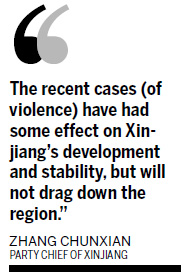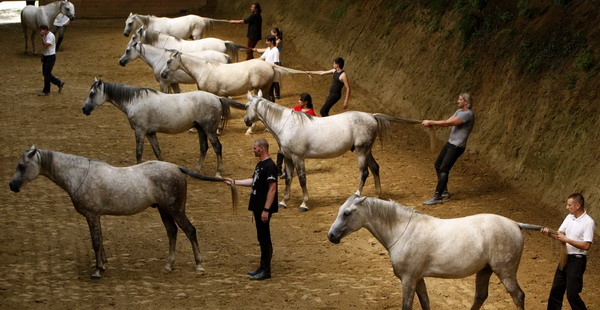Xinjiang bolsters combat against religious extremists
Updated: 2011-08-09 08:23
(China Daily)
|
|||||||||||
|
![A security worker checks a motorcycle at the entrance of a main shopping street in Kashgar, Northwest China's Xinjiang Uygur autonomous region, on August 4. [China News Service] Xinjiang bolsters combat against religious extremists](../../images/attachement/jpg/site1/20110809/0013729e48090faaba801c.jpg) |
|
A security worker checks a motorcycle at the entrance of a main shopping street in Kashgar, Northwest China's Xinjiang Uygur autonomous region, on August 4. [China News Service] |
URUMQI - The top official of Northwest China's Xinjiang Uygur autonomous region has ordered a crackdown on religious extremists in the region's latest campaign against terrorism.
Zhang Chunxian, Party chief of Xinjiang, made the pledge at a regional government meeting following a trio of deadly attacks in the region.
Zhang ordered local officials to rely on the public to help them curb illegal religious activities and to crack down on the use of religion to incite violence or organize terrorist attacks, local media reported on Monday.
He said the management of religious affairs should follow the central government's policy of "protecting the legitimate, banning the illegal, fighting infiltration and cracking down on crimes."
|
 |
Nearly 42 percent of Xinjiang's 21 million people are Uygurs, a largely Muslim Chinese ethnic group. The region is considered to be a frontline in China's fight against separatism, religious extremism and terrorism.
Two bloody attacks occurred in the region's city of Kashgar during the last weekend of July, leaving at least 14 civilians killed and 42 others injured. Police killed eight terrorists during the attacks.
The Kashgar violence followed a July 18 terrorist attack targeting a police station in the city of Hotan that left 18 people dead, including 14 terrorists.
Zhang said the region's current anti-terrorism campaign is meant to stem the tide of violence and prevent the attacks from fomenting riots.
Experts have said the recent Xinjiang violence shows clear signs of religious extremism, which may continue to inspire attacks in the region if it is not effectively checked.
A local anti-terrorism expert who declined to be named previously told Xinhua that the government leadership must curb the spread of extremism among local religious believers.
He said the extremists have taken advantage of the government's policy on religious freedom and are indoctrinating people through a form of extremist evangelism.
Local media reports quoted Zhang as saying that the government meeting was held to ensure that the region's anti-terrorist campaign is in accord with the latest instructions from President Hu Jintao and other top leaders.
Zhang said the central leadership has paid great attention to stability in Xinjiang and President Hu has given "important instructions" on how to deal with the situation.
Last Friday, Zhang also consulted leading ethnic officials in Xinjiang about ways to strengthen the region's management of religious affairs.
"Illegal religious activities are a key factor influencing Xinjiang's stability. Hostile forces are using illegal religious gatherings to organize separatist activities," said Turkan Pita, head of the regional government's ethnic affairs committee, which also oversees the management of religious affairs.
Other ethnic officials called for the carrying out of a thorough study of religious trends in Xinjiang and other parts of the world and said much can be learned from the experiences other countries have had in governing religious affairs.
The region's senior officials also urged imams from Islamic mosques in the region to join in the fight against illegal religious practices and guide their followers to recognize "the nature of the 'three forces' - separatism, extremism, and terrorism", and to contribute to ethnic unity.
Xinjiang is still recovering from a deadly riot that occurred in its capital city of Urumqi two years ago.
On July 5, 2009, a crowd, wielding knives and throwing rocks, looted shops, torched vehicles and killed nearly 200 people in the city's downtown, marking the worst outbreak of violence seen in the region in decades.
The recent attacks in Kashgar cast a shadow on Urumqi residents, who had been trying to resume a normal life.
"I think what happened in Kashgar is more scary because they were random attacks and no one could prevent them," Alimjon Abudurehman, a 22-year-old Xinjiang University student, told China Daily on Monday. "Living in fear is the worst part."
Authorities blamed overseas groups for inciting the riot.
Earlier this month, Meng Jianzhu, public security minister, said China will deploy more anti-terrorism forces in Xinjiang.
"The recent cases (of violence) have had some effect on Xinjiang's development and stability, but will not drag down the region," Zhang said, urging officials to carry on with development and welfare projects.
Xinhua - China Daily
Related Stories
Xinjiang top official vows crackdown on extremists 2011-08-08 11:03
Business dull in Xinjiang after riot 2011-08-05 06:56
Xinjiang identifies terror organization 2011-08-02 07:49
Hot Topics
Anti-Gay, Giant Panda, Subway, High Speed Train, Coal Mine, High Temperature, Rainstorm, Sino-US, Oil Spill, Zhu Min
Editor's Picks

|

|

|

|

|

|







